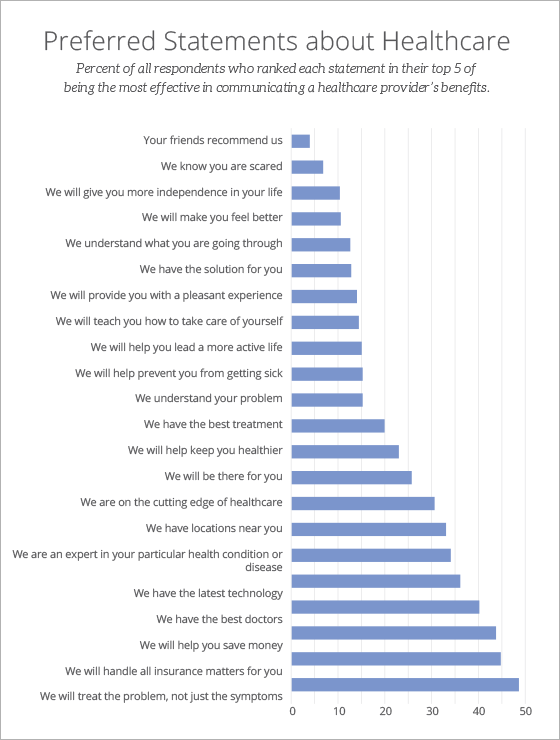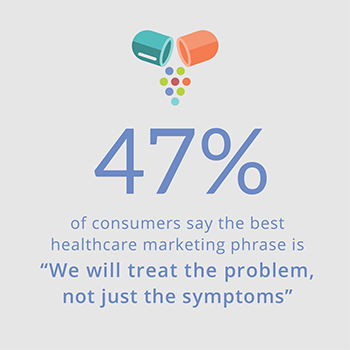Sign up for our LAVY email
and get our bi-monthly newsletter.
This article is a brief abstract of our exclusive study that takes the guesswork
out of healthcare advertising and marketing.
Download the complete 2017 Southwest Healthcare Marketing Report
 Every brand strives for a big idea. Something that sets them apart. A phrase that encapsulates what they do and how they do it. For some companies, this branding statement becomes a north star, a beacon that guides product development and marketing.
Every brand strives for a big idea. Something that sets them apart. A phrase that encapsulates what they do and how they do it. For some companies, this branding statement becomes a north star, a beacon that guides product development and marketing.
Like businesses in all industries, healthcare providers seem to be perpetually searching for effective brand statements and value propositions that will resonate with consumers. These successful branding statements are hard to come by. It’s difficult to know with certainty what messaging will move consumers to take action—choose a hospital, select a physician or buy health insurance.
To help businesses craft their healthcare branding messages, LAVIDGE has commissioned a study in which we asked consumers about their healthcare marketing preferences. One of the survey questions presented a wide variety of specific healthcare branding phrases, and we asked consumers throughout the Southwest which brand messaging they preferred.
In the chart accompanying this article you’ll see that although no statement broke the 50% mark, consumers have expressed clear preferences that are worth noting.
Great market research can be about confirming suspicions. It’s always satisfying to know that a target market will respond favorably to branding messages. But it’s just as gratifying of an experience when respondents provide surprise, which is the case with this question. We did not predict that the top answer (at 47.7%) would be “We will treat the problem, not just the symptoms.” That is a profoundly intellectual statement that operates on many levels. It acknowledges an understanding about cause and effect, and suggests that while it would be nice to make an ache go away, it’s important to discover its reason. This sophisticated phrase is telling; consumers understand the concept of wellness and are willing to participate in content marketing, public relations or social media marketing communications which take a deep-dive into their health.
 One of the respondents said that they are “More interested in getting to the root cause of the problem as a treatment for symptoms.” Similarly, another said, “I can’t stand it when there is a way to cure a condition and the doctor masks the symptoms instead of mixing the relief with the cure.”
One of the respondents said that they are “More interested in getting to the root cause of the problem as a treatment for symptoms.” Similarly, another said, “I can’t stand it when there is a way to cure a condition and the doctor masks the symptoms instead of mixing the relief with the cure.”
The next most-favored statement is more predictable, but it points the way toward a competitive advantage for healthcare-related companies that master it. An entity with a brand promise to “handle all insurance matters for you” will be welcomed in the market if the company delivers on that promise. This is a pain point for consumers—whether they don’t know how to handle health insurance or they find it troublesome. Either way, institutions that can alleviate this headache will likely find consumers lining up. The data shines a light on marketing trends, and therefore an opportunity for healthcare market disruption.
The least-liked answers to this question are also worth noting for your marketing plan. Consumers don’t seem to care about a brand identity understanding what they are going through. Nor do they want to be taught how to take better care of themselves or lead a more active life. People may desire those things, but they are saying they will not respond to brand strategy containing marketing messages or creative with those sentiments.
Perhaps most surprising is the least preferred statement: “Your friends recommend us.” This is contrary to other studies. A 2009 report by Razorfish concluded that close family friends are the biggest influencer of purchasing behavior. We have been told that when people have difficulty choosing a doctor or a health plan, they ask friends for advice regarding their healthcare brand experience. But that’s not the case with this consumer audience.
Data does not isolate any gender differences in responses, but there are two demographic-related findings of note for healthcare industry brands when planning marketing strategy.
BIO: Stephen Heitz is LAVIDGE’s Managing Director, Interactive. Tim Trull is the agency’s Managing Director, Strategy.

Sign up for our LAVY email
and get our bi-monthly newsletter.